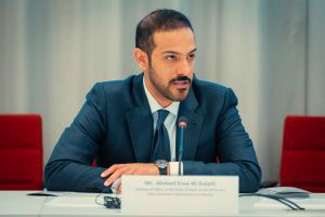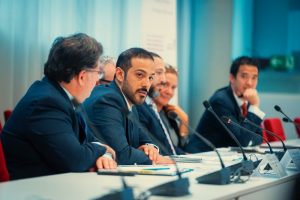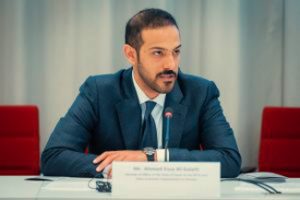
Interview with Mr. Al Sulaiti, Director of the Qatar office to the Trade and Economic Organizations in Geneva
Mr. Al Sulaiti, thank you for agreeing to this interview. Before your appointment as the current Director of the Qatar office to the Trade and Economic Organizations in Geneva in 2022, you worked as a commercial attaché and legal counsel with a background in international business, commerce, trade, comparative law, and international arbitration. You’ve spearheaded the development of multiple joint programs and initiatives between WIPO and various institutions in Qatar on the importance of IP. And recently, Qatar has celebrated its accession to the Madrid Protocol on October 7th. Can you please tell us why this is such a big step?
Thank you for having me. Qatar’s accession to the Madrid Protocol is an unparalleled historic achievement, as it marks a monumental step in our country’s evolution. This accession facilitates the alignment of Qatar’s IP system with international standards which will allow business owners and innovators to protect their trademarks efficiently across 130+ countries with a single application. This not only simplifies the process but also enhances the competitiveness of businesses in Qatar by enabling them to expand into global markets with greater ease. This move is particularly important for our ongoing economic diversification, especially in sectors like technology, manufacturing, and the creative industries, as the country transitions away from reliance on hydrocarbons.
This is also fundamental in our modernization efforts, particularly with regard to the legal and regulatory frameworks. It reinforces Qatar’s commitment to building a knowledge-based economy where innovation and intellectual property are central to growth. On the international stage, it strengthens Qatar’s reputation as a leader in IP protection and demonstrates the country’s dedication to global cooperation.
Our SME exhibition and panel discussions are a testimony of the creativity Qatar is endorsing and the strides it is taking to instate intellectual property as a propelling force towards its national objective. We do support all kinds of creative ideas and this is simply a sample of them. We hope that in the foreseeable future, more aspiring entrepreneurs will feel emboldened to start a venture knowing fully well that the State will equip them will all tools necessary to protect their intellectual property and their business.
Qatar has developed quite an ironclad partnership with World Intellectual Property Organization throughout the years, which is quite evident through the different joint programs launched between WIPO and various Qatari institutions. What is the significance of WIPO’s partnership for Qatar?
The partnership we have with the World Intellectual Property Organization (WIPO) is strategically integral to our country’s long-term transition to a knowledge-based economy conducive to the attraction of Foreign Direct Investment (FDI). IP is indispensable as we implement digitalization in all spheres. We decided that the best course of action to facilitate this transition would be to harness WIPO’s excellent capacity building programs to a variety of stakeholders in all practices, with a concerted effort and objective to proliferate IP knowledge at the mitochondrial level of our society. For instance, we have signed MoU’s in the past with WIPO such as the one signed with Hamad Bin Khalifa University in 2022 to develop human resources capacity in IP law through teaching and practical skills development in J.D, LL. And S.J.D degree programs. Recently, another MoU has been signed on October 7th between WIPO and the Qatar International Court and Dispute Resolution Centre to settle IP disputes through Mediation and Arbitration and to provide training programs to mediators and arbitrators. We hope to expand IP training to diplomats in the foreseeable future and to sign more MoUs with other Qatari institutions.
Additionally, this partnership is instrumental in developing the legal foundation for alternative dispute resolution (ADR) in conjunction to mediation and arbitration which are correlative to IP knowledge. In the same vein, the International Conference on Mediation and Arbitration on the Role of IP in Fostering Economic Growth: Analyzing the Link Between Protected IP Rights and FDI Inflows held in Doha last June was dedicated to discussing the legal groundwork to designate IP as the catalyst in our transformative strategy. The participation of diverse stakeholders like the Qatar International Court, the Qatar Science and Technology Park, various Qatar based law firms, and the Ministry of Commerce and Industry is an example of the cross pollination of expertise we are targeting.
How would Qatar joining the Madrid Protocol affect its intellectual property, particularly in protecting traditional knowledge, and what does this mean for Qatar’s cultural identity and innovation in a globalized world?
This answer to this question has two parts. First, Qatar’s accession to the Madrid Protocol enhances the country’s ability to protect traditional trademarks, our heritage, and our innovative pursuit. The state has been heavily involved in promoting its R&D by investing international research projects and innovations in areas such as healthcare, energy, and IT. We are also involved in AI research with a focus on machine learning, data science, and computational biology. All these initiatives fall under the umbrella of our national objective, which is to become a hub of discovery. The Madrid Protocol will help us protect inventors’ trademarks in multiple international markets.
Secondly, Qatar’s history is rich and goes back over a millennium, long before the arrival of Islam in the Arabian Peninsula. It is essential that the knowledge that derives from these customs and traditions is preserved and immortalized for ourselves and for the coming generations. As it is also important for these generations to know who they are and where they come from and that any work they produce is protected and properly accredited. This accession is therefore a symbol of Qatar’s commitment to cultural sovereignty, preserving what makes us unique while contributing to the collective knowledge and creativity of the world. We hope that this move will incite all our youth to be more entrepreneurial and express their creativity freely.
Given Qatar’s commitment to fostering international cooperation, how do you envision the role of diplomatic channels in resolving intellectual property disputes under the Madrid Protocol? What strategies can Qatar pursue to enhance these efforts while promoting sustainable economic development?
I definitely perceive diplomatic channels as essential conduits to fostering international cooperation in resolving intellectual property disputes under the Madrid Protocol. Our approach focuses on collaboration and dialogue, leveraging our relationships with both regional and global partners to create a unified stance on intellectual property rights.
For instance, we have been engaged in multilateral forums such as hosting WIPO’s regional meetings and provides a platform for dialogue on intellectual property issues to allow members to share best practices and to harmonize their approach to the Madrid Protocol.
We have also been involved in various capacity building initiatives aimed at enhancing the understanding of intellectual property rights amongst its regional partners, as evoked before. These workshops and training sessions that focus on the MP benefit an array of experts from different walks of life.
Qatar’s diplomatic neutrality in regional conflict resolution leverages its position as a mediator in intellectual property rights. We’ve facilitated discussions between businesses from different countries facing trademark disputes to reach amicable settlements. The provision of a neutral ground for dialogue distinguishes Qatar as a hub for international cooperation and trade.
The Office of the WTO and Other Economic Organizations has spearheaded many engaging initiatives under your directorship to implicate Qatar as an active player in the multilateral objectives towards a sustainable future at home and abroad. What is the ultimate objective of your leadership and how does that manifest itself for your country?
When I say that Qatar is an untapped reservoir of talent, I don’t say this with bias. We have prodigies in every conceivable category, whether it be art, filmmaking, philosophy, architecture, music, or else. My work as director has been devoted to a vision of Qatar as an anchor and beacon of discovery for the Arab world and a global destination for knowledge seekers. I envision a society governed by the pursuit of knowledge at the core of its raison d’etre, as echoed in our National Vision 2030. We want the greatest scientific and medical advancements towards the cure of diseases to be made in Qatar. We want to see brilliant women and brilliant men develop sustainable business solutions to reverse the damages caused to our oceans, our soil, and our air. Likewise, we want these brilliant minds to be an inspiration for others and a service to the whole of humankind. Most importantly, we want our society to reconnect with a forgotten wisdom that reposes on human creativity as the gateway to a better interconnected world and that ultimately, all our efforts here in Geneva facilitate the ideal conditions for this society to thrive in concert with its planet and its cosmos. We wish to consolidate in public consciousness that human creativity is limitless and the most valuable asset a State can rely on. It is incumbent upon me as a representative of Qatar to expedite this reality for the younger generations and to share the best practices with the international community at large. I consider it a service to my country and a fulfillment of my obligations as a diplomat.







